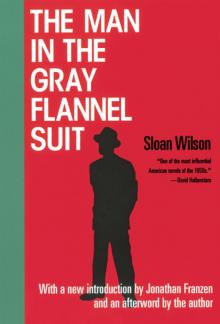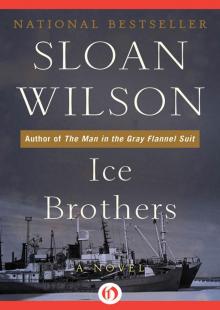- Home
- Sloan Wilson
Man in the Gray Flannel Suit Page 16
Man in the Gray Flannel Suit Read online
Page 16
“The liquor’s in the big red wastepaper basket,” Betsy said cheerfully.
Quietly Tom poured himself a drink.
“That Mr. Howard called again today,” Betsy said. “I told him we were moving into Grandmother’s house. He seemed quite disappointed–and no wonder. I found something out about him.”
“What?” Tom asked somberly.
“He’s a professional real-estate man–that’s a lot of malarky he gave us about wanting to buy the place for his own use. He’s the real-estate man for that restaurant company. Mrs. Reid, the agent who sold this place for us, recognized his name and told me.”
“He wouldn’t want to put a restaurant way up on that hill,” Tom said. “They build that kind of restaurant near highways.”
“Mrs. Reid says he probably didn’t want it for a restaurant–he speculates on real estate for himself on the side. He probably wanted to do just what we’re going to do with it. I think that’s a good sign.”
A good sign, Tom thought–that’s what I need. The old premonition of disaster was sneaking up on him. I’ve had it a million times before, he thought–it doesn’t mean a thing. I’m doing all right on my job. Hopkins likes me. We’re really being smart to sell this place and move to Grandmother’s house. We’re going to make a damn good thing of it!
He couldn’t convince himself. Even if I do get fired, it won’t matter, he thought. We’ve got a little cash now. I’ll get into some kind of business for myself. I’ll work full time on selling Grandmother’s house.
Suddenly he had a picture of himself hanging around his grandmother’s house, precisely as his father had, with nothing to do. He glanced down and found he was gripping his right thigh so hard that his knuckles were white. He hadn’t done that for some time. Why the hell should I get scared in peacetime? he thought. Deliberately he stood up. It doesn’t really matter, he thought. Here goes nothing. It will be interesting to see what happens.
“Betsy!” he said. “Is there any packing I can help you with?”
“Not a thing! Say, guess what I found today while I was cleaning out the attic!”
“What?”
“Your old mandolin–I packed it in one of the boxes. You ought to get it fixed up. It would be fun.”
“I will sometime,” he said.
“Daddy,” Janey said, “tell us a story about Bubbley.”
“All right,” Tom said. “Once upon a time there was a little dog named Bubbley. He swallowed a cake of soap, and . . .”
“Don’t tell it so fast!” Barbara said.
“. . . every time he barked, he blew bubbles,” Tom said, spacing the words evenly. “One day a man from a circus saw him. . . .”
He told the story well and repeated it twice upon request.
17
“WILL GRANDMOTHER BE THERE when we get there?” Janey asked.
It was late Saturday afternoon. They were droning along the Merritt Parkway from Westport to South Bay, with the car packed tightly with suitcases and paper cartons of clothes. Tom had just signed the deed transferring the little house on Greentree Avenue to its new owner, who had seemed overjoyed to get it.
“Grandmother is dead,” Betsy said gently. She had already explained this to the children several times.
“Do dead people ever come back?” Barbara asked.
“No,” Tom said.
“Do they like being dead?” Janey inquired.
“I don’t know,” Tom said.
“Grandmother is in heaven,” Betsy said. “I’m sure she’s happy there.”
The engine of the old Ford was knocking, and the indicator on the dashboard showed it was heating up. Tom slowed down to twenty-five miles an hour and stayed at the extreme right edge of the highway. He had always had a horror of breaking down on the Merritt Parkway with the children along, and of not being able to get the old car off the pavement. Now other cars regularly blared their horns as they flashed by.
“We’ll have to get a new car pretty soon,” Betsy said. Tom didn’t answer.
“Where is Grandmother now?” Janey asked. “What did they do with her when she got dead?”
“Her soul went to heaven,” Betsy said. “Her body has been buried in the cemetery.”
“Does she ever try to get out of the cemetery?”
“No,” Tom said.
“She’s not really in the cemetery,” Betsy said. “Her spirit is in heaven.”
“How long is it going to be before we get there?” Barbara asked.
“Get where?” Tom said.
“Grandmother’s house.”
“About half an hour.”
“Can I have a drink of water?” Janey inquired.
The engine seemed to be knocking louder. Don’t break down now, Tom thought. Not now. Somehow it would have seemed a very bad omen to have the car break down while they were moving to Grandmother’s house.
When they got off the parkway, they stopped at a restaurant and had supper. By the time they reached the winding road leading up the hill to the big house, it was almost dark. The heat indicator on the dashboard of the old car touched the red line marked “danger.” Tom slowed to ten miles an hour, shifted into second gear, and crawled around the sharp turns by the massive outcroppings of rock. The engine kept going. Finally he saw the stone posts, with the tall iron urns on them, turned into the driveway, and shifted into low gear as he passed the grove of oak trees, the carriage house, and the rock garden. Ahead of him the old mansion loomed, silhouetted against the sky. Tom parked the car near the house and cut off the tired engine. Old Edward opened the front door of the house and stood framed in it. “Good evening, Mr. Rath,” he said.
Ever since he could remember, Tom had taken old Edward for granted–he had to think hard to remember his last name, which was Schultz. Now Tom looked at him closely, as though he had never seen him before. Edward was a tall man about sixty-five years old, thin and bent at the shoulders. Deep lines ran from the edges of his nose to the corners of his mouth, and his brow was furrowed. What kind of life has he led? Tom wondered. What has he done all these years when the supper dishes were washed? He remembered his grandmother telling him that Edward kept canaries in his room. Somehow it didn’t seem possible.
Now Edward stood holding the front door open with one hand, his face stern and unwelcoming. The children, tired of being pent up in the car, dashed ahead of their parents into the big house, but, surprised by the dim and somehow eerie light of the front hall, skidded to a stop, rumpling a scatter rug. Tom and Betsy came in, carrying boxes and suitcases. Edward made no motion to help them. When they got inside, he let the front door close softly behind them. “I would like to talk to you, Mr. Rath,” he said.
There was no deference in his manner–that’s why he seemed like an entirely different man. There was also no friendliness. His voice was cold, almost supercilious, perhaps a little mocking, Tom thought, wondering if it were simply his imagination.
“As soon as we get these things put away,” Tom said. Edward stood watching him and Betsy as they carried their bags upstairs. The children, oddly subdued, followed their parents.
“What room shall we put our things in?” Betsy asked, breathing hard.
“Grandmother’s, I guess,” Tom said. “We’ll want the children on the same floor with us, so I guess we won’t use the third floor. If the girls want to stay together we can put them in the large guest room, and Pete can have the room I used to have.”
The door to his grandmother’s room was not latched. Without putting his suitcases down, he pushed it with his toe. It swung open, revealing the big four-poster bed, which looked strangely wide and empty. From the walls of the room old paintings of “The Senator” and “The Major” as children stared from ornate gilt frames. Barbara and Janey, abruptly recovering their spirits, leaped onto the big bed and started jouncing up and down.
“Get off there!” Tom said sharply.
The children looked startled. “Why?” Janey asked.
�
��We don’t want you to mess up the bed,” Betsy replied kindly. She piled the boxes she had been carrying on a chair.
“I think I’ll go down and talk to old Edward right away,” Tom said.
“What are you going to tell him?”
“I don’t know–that we won’t know what we can do for him for some time, I guess.”
Edward was waiting for him at the bottom of the stairs. “Let’s go into the living room and sit down,” Tom said.
The old man followed him silently. Tom sat in an armchair, and Edward sank negligently into the rocking chair old Mrs. Rath had always used. Somehow he looked shockingly incongruous there, as he crossed one knee over the other and leaned back.
“You wanted to talk to me?” Tom asked. He thought it would be better to let Edward start.
“When are they going to read the will?”
“Read the will? I don’t know that they are going to. Mrs. Rath’s lawyer has it. Why do you ask?”
“Do you know what she left me?”
“Mrs. Rath spoke to me about you shortly before she died,” Tom said. “She asked me to do what I could for you, and I intend to try. You weren’t mentioned in the will specifically.”
“I wasn’t mentioned!” Edward said. He leaned forward in his chair.
“I intended to talk to you about it,” Tom said. “As you may know, Mrs. Rath did not leave a great deal. It will be some time before I know precisely what I can do for you, but I assure you I’ll do all I can.”
“I don’t believe it!” Edward replied. “She said she’d remember me in her will!”
“Perhaps Mrs. Rath was a little confused . . .” Tom began.
“I don’t believe it! I’ll go to law! I’ve got proof!”
“I don’t think that will be necessary,” Tom said. “I don’t want you to worry. I don’t have much to give, but as long as we have this house, you’ll at least have a place to stay, and in time I hope to work something out for you.”
“I don’t need your charity!” the old man said. “I’ve saved my money–I’ve probably got a lot more than you have! I only want my just due!”
“I won’t be able to tell you how much I can give you until the estate is settled,” Tom said.
“Never mind that! I want to see the will! I don’t believe she didn’t mention me. She promised she’d leave me the house.”
“The house?”
“That’s right–I’ve got proof!”
“You must be mistaken,” Tom said. “She spoke to me often about leaving me the house. Are you sure you aren’t imagining all this?”
“Of course I’m sure! Why do you think I’ve stayed here all these years? Why do you think I took her orders, and cooked her food, and did her laundry, and cleaned up her dirt? Do you think I loved the old woman?”
Tom stood up. He didn’t mean to, but he suddenly rose out of his chair and stood towering over Edward. There was an instant of complete silence. When Tom spoke his voice was soft. “Don’t talk like that about Mrs. Rath again,” he said.
Edward stared up at him and said nothing. His face was white, perhaps with anger, perhaps with fear. Tom hadn’t meant to lunge out of his chair so fast. Slowly Tom sat down. “Now listen,” he continued quietly. “I frankly don’t believe Mrs. Rath ever promised you anything. She didn’t make promises like that, and if she had, she would have told me. But I’m willing to admit that you had a right to expect something, and that perhaps she said things which encouraged you. It’s quite possible that as she grew older she grew confused and thought she had more than she did. Now get one thing straight: she didn’t have much to leave anyone. By the time the estate is settled, and the mortgage on this house is paid, there probably won’t be much more than the house and land. I intend to sell them if I can, and I intend to see you’re as well cared for as possible, but I’m not going to promise you anything now. You worked here of your own free will for a salary, and you’ll take what I can give you. Until I can get things organized and sell the land, you can keep your room and have your meals here if you want, and if you mind your tongue. You will not be required to do any work.”
“I’ll get a lawyer!” Edward said. “I’ll sue! I’ve got proof she meant the house for me!”
“The will leaves it to me,” Tom said. “The only question now is whether you’re going to be reasonable and take what you can get, or whether you’re going to keep on like this and get thrown out of here tonight.”
“I’ll leave, but you’ll hear from me!”
I mustn’t get angry, Tom thought. He’s an old man. He had a right to expect something. Maybe she did make him promises, or at least, maybe he thought she did. I mustn’t get angry. “Calm down,” he said. “It’s not going to do either of us any good to get excited.”
“You’re cheating me!” the old man said. “Either you are or she did! She was crazy! She was filthy! She never took a bath. She was . . .”
“Stop!” Tom said. His voice was like the report of a gun. The old man drew in his breath sharply.
“Now get out of here,” Tom said. “Go down and pack your bags and call a taxi, and get out of here. If you’re not gone in an hour I’ll throw you out.”
“I’ll get a lawyer,” Edward said. “You think I can’t afford one. I can get the best. The house is mine, and I’ve got proof.”
“Get all the lawyers you want, but right now, get out of that chair,” Tom said. “And stay in the servant quarters until the taxi comes.”
Edward got up. Tom waited until he had left the room before going upstairs.
“What happened?” Betsy said. “You look upset.”
Tom lay down on the big double bed and stared up at the crocheted canopy stretching like a net overhead. “I got angry,” he said.
“At Edward?”
“Yes–I threw him out. He’s leaving in an hour.”
He told her about it then, and as he talked, her indignation grew. “Of course you got mad!” she said. “I would have hit him.”
Tom didn’t move. He felt limp and utterly exhausted. “I get angry too easily,” he said. “Tonight I had a real impulse to kill Edward. Often I feel as though I’d like to kill Ogden, at the office. It’s strange that I am permitted to kill only strangers and friends.”
“What?”
“Nothing. I’m awfully tired.”
“That was such a funny thing you said about killing strangers and friends.”
“I meant the war,” he said.
“Did you ever kill anyone?”
“Of course.”
“I mean, did you personally ever kill anyone? You’ve never talked to me about it at all.”
“Right now I’m too tired. I want to go to sleep.”
He stirred restlessly and shut his eyes. In the dim light from the window, Betsy lay looking at his big hands lying quietly folded on top of the covers. “I cannot imagine your killing anyone,” she said.
There was no answer. Betsy lay looking at him for several minutes before trying to go to sleep. How strange, she thought, to know so little about one’s husband. I wish he would talk to me about the war, but I should know better than try to make him. After all, a good wife isn’t supposed to ask her husband questions he obviously doesn’t want to answer.
18
IT TOOK both Tom and Betsy a long while to get to sleep that night. They lay in the dark, separate and silent. Neither of them commented when they heard a taxi drive up to the house and the front door slam. For some reason, each felt a necessity to feign sleep. Downstairs the old grandfather’s clock which had marked the passage of Tom’s boyhood continued to mourn the loss of each hour.
Only a few minutes after Tom had finally got to sleep, he was awakened by a piercing scream from the next room. He leaped out of bed and, followed by Betsy, ran to the room where the two girls were sleeping, and snapped on the light. Janey was sitting bolt upright in her bed, crying. Tears were running down her face. Betsy ran to her and picked her up. “What’s the matter, baby?�
� she said. “Did you have a nightmare?”
Janey said nothing. She hugged her mother tightly with both arms, and gradually her cries subsided into sobs. In the bed on the other side of the room, Barbara slept peacefully, oblivious to any disturbance. Betsy took Janey into the room she and Tom were using and put her down on the big bed. Tom put the lights out, and he and Betsy lay there in the dark, with the child between them. Janey’s sobs stopped. She gave a long, shuddering sigh and, still clinging tightly to her mother, went to sleep.
I wonder what she dreamed, Tom thought. What does a child have nightmares about? Did she dream that wild beasts were chasing her, or about drowning, or falling through space? What does a child fear most?
“Betsy, are you still awake?” he whispered. The steady, mingled breathing of mother and child was the only answer.
When Tom awoke in the morning, he felt drugged, as though he had been drinking heavily. No one else was in the big bed. Glancing at the familiar face of his wrist watch, he saw it was almost nine-thirty. He jumped to his feet. “Betsy!” he called. “I’ve missed my train!”
She was nowhere in the room. In his pajamas, Tom ran downstairs, through the living room and the dining room to the big old-fashioned kitchen, where Betsy was washing dishes. “I’ll be late to work!” he said. “I’ve got to get another draft of the speech done!”
She looked up and smiled. “It’s Sunday,” she said.
“Oh,” he replied ruefully, “I forgot.” He stood in the middle of the big kitchen, a little confused. Bright sunlight streamed through the window. “Where are the kids?” he asked.
“Outside. That old rock garden is a wonderful place for them to play.”
“I think I’ll go upstairs and catch another nap,” he said.
“Don’t you dare! I’ve been up since seven o’clock unpacking, and now we’re going to church! And before that we’re going to make a list of all the things we have to do.”

 A Summer Place
A Summer Place Pacific Interlude
Pacific Interlude Man in the Gray Flannel Suit
Man in the Gray Flannel Suit Ice Brothers
Ice Brothers